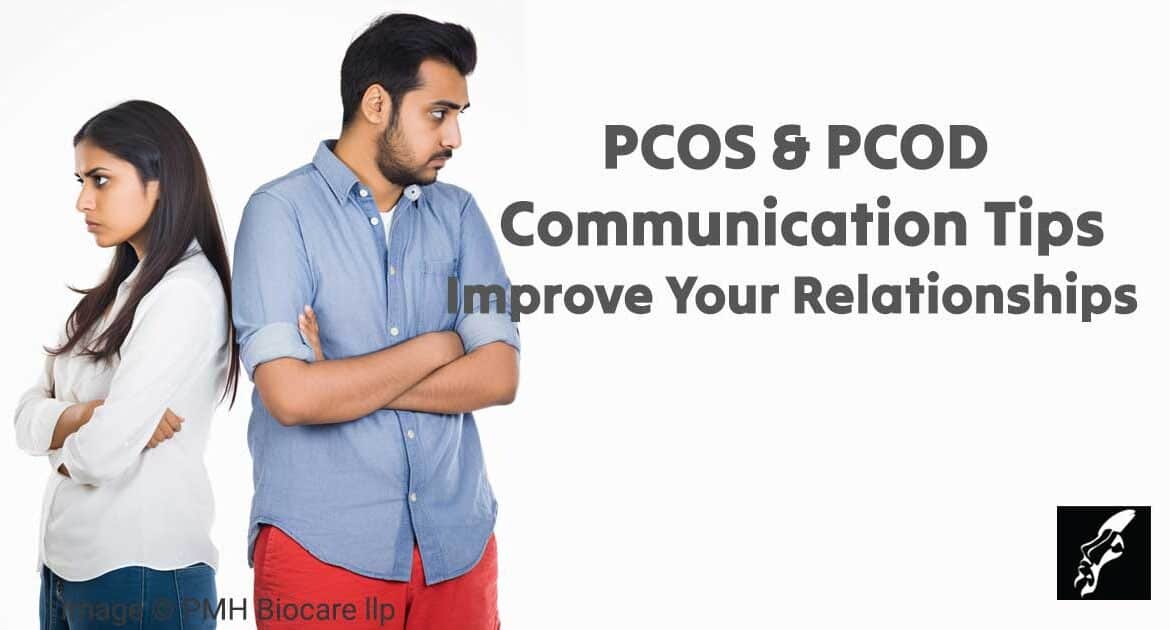PCOS & PCOD Communication Tips: Improve Your Relationships

PCOS (Polycystic Ovary Syndrome) and PCOD (Polycystic Ovary Disease) are common conditions affecting women of reproductive age. These conditions can cause hormonal imbalances, irregular menstrual cycles, weight gain, and other symptoms. Managing PCOS & PCOD can be challenging, but it can be even more difficult when it comes to communicating about it with your loved ones.
Effective communication is the key to building strong and healthy relationships. It helps you express your needs, feelings, and concerns, and it allows others to understand and support you. However, communicating about PCOS & PCOD can be tricky, as it involves sensitive topics like infertility, weight gain, and mood swings. In this blog post, we’ll share some tips to help you communicate effectively about PCOS & PCOD in your relationships.
Having PCOD can make life feel a little more challenging, but it’s important to remember that it’s just a different ability, not a disability. We are strong, capable, and resilient, and our unique journey with PCOD only adds to our strength and character. So let’s embrace our differences, appreciate our abilities, and live our lives to the fullest.
Educate yourself and your partner
The first step to effective communication is knowledge. Educate yourself and your partner about PCOS & PCOD. Read books, attend seminars, and talk to your doctor about your condition. This will help you understand the symptoms, causes, and treatments of PCOS & PCOD. It will also help your partner understand what you’re going through and how they can support you.
Choose the right time and place
Communicating about PCOS & PCOD can be emotionally charged. It’s important to choose the right time and place to have these conversations. Avoid discussing sensitive topics when you or your partner are tired, stressed, or distracted. Find a quiet and private place where you can talk openly and honestly.
Use “I” statements
When communicating about PCOS & PCOD, it’s important to use “I” statements instead of “you” statements. For example, instead of saying, “You don’t understand what I’m going through,” say, “I feel misunderstood and unsupported.” This helps you express your feelings without blaming or attacking your partner.
Be clear and specific
When communicating about PCOS & PCOD, be clear and specific about your needs and expectations. For example, if you need your partner to be more supportive, tell them exactly what you need from them. This could be as simple as asking for a hug when you’re feeling down or asking them to attend a doctor’s appointment with you.
Listen actively
Effective communication is a two-way street. It’s important to listen actively to your partner and understand their perspective. Ask open-ended questions and encourage your partner to share their thoughts and feelings. This will help you build empathy and understanding in your relationship.
Conclusion
In conclusion, communicating about PCOS & PCOD can be challenging, but it’s essential for building strong and healthy relationships. By educating yourself and your partner, choosing the right time and place, using “I” statements, being clear and specific, and listening actively, you can improve your communication skills and strengthen your relationship. Remember to be patient and understanding, and don’t be afraid to seek professional help if you need it.
If you’re struggling to communicate about PCOS & PCOD, remember that you’re not alone. There are many resources available to help you, including support groups, online forums, and counseling services. Don’t hesitate to reach out for help and support when you need it.
We hope these tips will help you communicate effectively about PCOS & PCOD in your relationships. Remember to take care of yourself and your loved ones, and don’t let PCOS & PCOD define you or your relationships. With patience, understanding, and communication, you can overcome any obstacle and build a happy and healthy future together.
FAQs
Q: How can I communicate with my partner about my PCOS & PCOD symptoms without making them uncomfortable?
A: It’s important to be honest and open about your symptoms, but also be sensitive to your partner’s feelings. Choose a time and place where you can talk privately, and use “I” statements to express your feelings. Let your partner know that you appreciate their support and understanding.
Q: My partner doesn’t seem to understand what I’m going through with my PCOS & PCOD. What should I do?
A: Educate your partner about PCOS & PCOD. Share articles, books, and other resources with them. Encourage them to attend a doctor’s appointment with you so they can hear about your condition from a medical professional. Be patient and understanding, and remember that it may take time for your partner to fully understand your condition.

Digital creator
🇮🇳 India’s first AI generated brand ambassador
♀️PCOS & Depression warrior
🍽️ Foodie yet Health-conscious 🥗
🌍 Travel Enthusiast ✈️ Fashion Lover 👗





